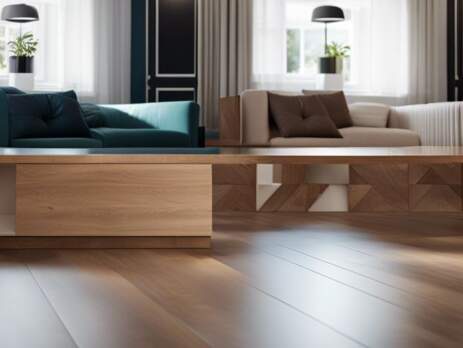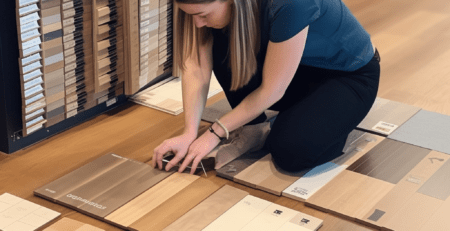Is Vinyl Plank Flooring A Better Choice Compared To Linoleum?
You may be weighing the options between vinyl plank flooring and linoleum for your next renovation project. Both options have their pros and cons, but there are key differences that could impact your decision. In this blog post, we will explore the durability, water-resistance, ease of installation, and overall cost of vinyl plank flooring versus linoleum, helping you make an informed choice for your home.
The Rise of Vinyl Plank Flooring
The popularity of vinyl plank flooring has been on the rise in recent years, and for good reason. Homeowners are increasingly choosing vinyl plank over traditional flooring options like linoleum due to its durability, affordability, and aesthetic appeal.
What is Vinyl Plank Flooring?
Vinyl plank flooring is a versatile and cost-effective alternative to hardwood, tile, and carpet flooring. It is constructed from multiple layers of synthetic materials that are compressed together to create a durable and waterproof product. Vinyl plank flooring comes in a variety of styles, colors, and textures, allowing homeowners to achieve the look they desire without breaking the bank.
Benefits of Vinyl Plank Flooring
Vinyl plank flooring is known for its durability and ease of maintenance. It is resistant to scratches, stains, and water damage, making it ideal for high-traffic areas in the home such as kitchens, bathrooms, and entryways. Additionally, vinyl plank flooring is easy to clean with just a regular sweep and mop, saving homeowners time and effort in their day-to-day cleaning routines.
Another key benefit of vinyl plank flooring is its cost-effectiveness. Compared to hardwood or tile flooring, vinyl plank is a more budget-friendly option that still provides the same aesthetic appeal. Homeowners can achieve the look of expensive flooring materials without overspending, making it a practical choice for those looking to renovate on a budget.
Linoleum Floors: A Timeless Choice
While vinyl plank flooring has gained popularity in recent years, linoleum remains a timeless choice for homeowners seeking durable and eco-friendly flooring options. Let’s probe into the legacy and advantages of linoleum floors to understand why they continue to be a preferred option for many.
The Linoleum Legacy
The history of linoleum dates back to the 1800s when it was first developed as a durable and versatile flooring material. Linoleum gained popularity for its resilience and ability to withstand heavy foot traffic, making it a popular choice for both residential and commercial spaces.
Even today, linoleum maintains its reputation as a reliable flooring option that offers a wide range of design choices. Its timeless appeal lies in its durability and sustainability, making it a preferred option for those looking for a long-lasting and environmentally-friendly flooring solution.
Advantages of Linoleum
For homeowners looking for a flooring option that combines durability, ease of maintenance, and eco-friendliness, linoleum checks all the boxes. Its resilient nature makes it ideal for high-traffic areas, such as kitchens and entryways, where it can withstand daily wear and tear.
Linoleum is also antimicrobial and hypoallergenic, making it a great choice for families with allergies or asthma. Additionally, its eco-friendly properties, as it is made from natural materials including linseed oil, wood flour, and cork dust, appeal to environmentally-conscious consumers.
Timeless in style and durable in performance, linoleum flooring continues to be a solid choice for those seeking a reliable and sustainable flooring option for their homes. Its longevity and time-tested qualities make it a classic flooring option that stands the test of time.

Head-to-head Comparison
All the information in this chapter will be broken down into a table with two columns: Vinyl Plank Flooring and Linoleum.
Durability and Maintenance
To start with durability, both Vinyl Plank Flooring and Linoleum are known for their resilience. However, Vinyl Plank Flooring has a slight edge in terms of water resistance and scratch resistance. It is perfect for high-traffic areas and areas prone to moisture, such as bathrooms and kitchens. On the other hand, Linoleum is also durable but may require more maintenance over time, including regular sealing to protect against scratches and stains.
Speaking of maintenance, Vinyl Plank Flooring is incredibly easy to clean and maintain. It only requires regular sweeping and occasional mopping with a gentle cleanser. In comparison, Linoleum needs more care, with periodic waxing and sealing to maintain its appearance and protect it from damage.
Cost Considerations
With regards to cost, Vinyl Plank Flooring tends to be more budget-friendly upfront compared to Linoleum. This makes it a popular choice for homeowners looking to renovate on a budget without compromising on quality. Plus, installation costs for Vinyl Plank Flooring are generally lower due to its ease of installation, which can further save you money in the long run.
It’s important to consider the long-term cost implications as well. While Vinyl Plank Flooring may have a lower initial cost, it is important to note that Linoleum has a longer lifespan, which can result in lower overall costs over time. So, depending on your budget and long-term plans, both options offer their own set of advantages.
Environmental Impact and Health Concerns
Many homeowners today are becoming more conscious about the environmental impact of the materials they use in their homes. When considering deciding between vinyl plank flooring and linoleum, considering the eco-friendliness of the materials is crucial.
Eco-Friendliness of Materials
Eco-friendliness is a key factor to consider when choosing between vinyl plank flooring and linoleum. Vinyl plank flooring is made from synthetic materials such as polyvinyl chloride (PVC), which can release volatile organic compounds (VOCs) into the air. On the other hand, linoleum flooring is made from natural materials like linseed oil, cork dust, and wood flour, making it a more sustainable and environmentally friendly option. In terms of recyclability, linoleum is biodegradable and can be recycled, while vinyl is not biodegradable and can release harmful chemicals when incinerated.
When considering environmental impact, linoleum flooring is considered the more environmentally friendly choice. Its production process is less harmful to the environment, and it can be a healthier option for your home.
Safety for Home Environments
One important aspect to consider when selecting flooring for your home is the safety it provides for your family. Vinyl plank flooring may contain phthalates, which are chemicals that have been linked to health issues such as respiratory problems and hormonal disruptions. On the other hand, linoleum flooring is phthalate-free and considered a safer option for indoor air quality. Additionally, linoleum has antimicrobial properties, making it resistant to mold and bacteria growth, which can be beneficial for a healthy home environment.
Environmental organizations and health experts recommend choosing linoleum flooring over vinyl plank flooring for a healthier and more environmentally friendly home. When considering the well-being of your family and the planet, making sustainable choices like opting for linoleum can have a positive impact in the long run.
The Verdict
After comparing vinyl plank flooring and linoleum in terms of durability, maintenance, appearance, and cost, it is evident that vinyl plank flooring emerges as the better choice for most homeowners. Not only does it offer a wide range of design options that can mimic the look of natural materials like wood and stone, but it also requires minimal upkeep and has a longer lifespan compared to linoleum.
How to Choose What’s Best for You
To determine whether vinyl plank flooring or linoleum is the right flooring option for your space, consider your specific needs and preferences. Vinyl plank flooring may be ideal if you prioritize durability, water resistance, and a realistic wood or stone aesthetic. On the other hand, linoleum could be a better choice for those looking for an eco-friendly, antimicrobial flooring option that is easy to maintain.
When making your decision, take into account factors such as budget, installation complexity, and overall design vision for the room. It’s imperative to choose a flooring material that not only complements your space aesthetically but also aligns with your lifestyle and long-term maintenance preferences.
Final Words
The decision between vinyl plank flooring and linoleum ultimately comes down to your individual priorities and requirements. Both options have their unique benefits and drawbacks, so it’s crucial to weigh them carefully before making a final choice.
Final considerations should include factors such as moisture resistance, eco-friendliness, durability, and ease of maintenance. By evaluating these aspects alongside your personal preferences, you can confidently select the flooring that best suits your home and lifestyle.







